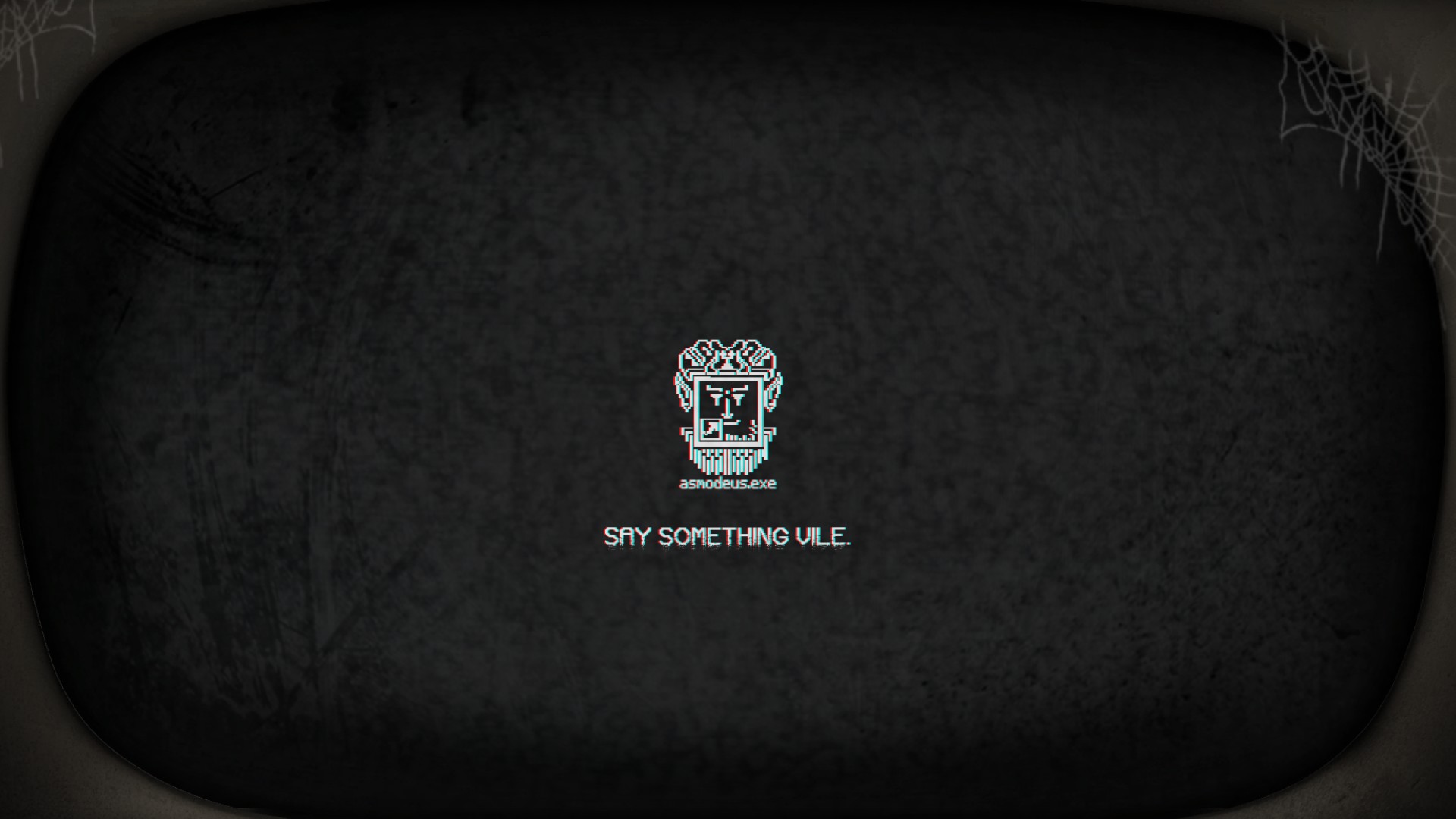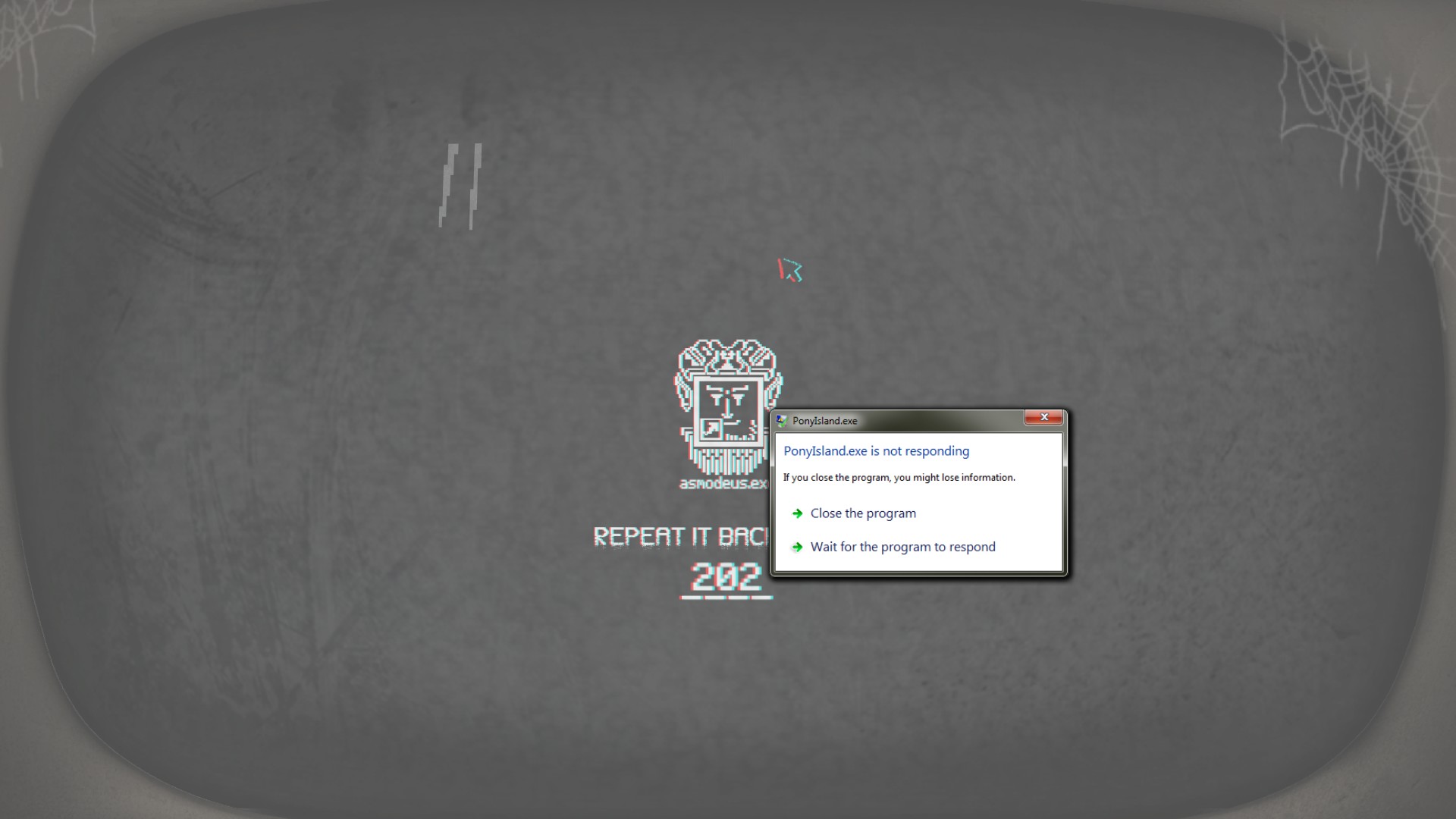Great moments in PC gaming: Facing Asmodeus in Pony Island
The most powerful weapon in his arsenal is access to your Steam friends list.

Great moments in PC gaming are bite-sized celebrations of some of our favorite gaming memories.

Year: 2016
Developer: Daniel Mullins
In Pony Island you're a lost soul trapped in Lucifer's own videogame, forced to jump a pony-unicorn over gates for all eternity as a beta tester for the Devil. Truly, a fate worse than death. By exploiting bugs in the game and deleting core files you can escape this digital limbo—if you figure out how to bypass the demonic AIs who guard those files.
The last of these is Asmodeus. He doesn't present you with a hacking minigame, or a new level of pony-jumping. He squats there in the middle of the screen, an icon labeled Asmodeus.exe, and tells you not to look away. All he wants you to do is answer some questions, using the blinking cursor that appears beneath him. First, he asks you to test the cursor. Just type whatever you want. "SAY SOMETHING VILE," he grins.
Reader, I did. And then I got the beep of a notification and a message from one of my Steam friends popped up to say "lol". And then another message from that same friend, repeating the word I'd just typed in Pony Island with a question mark. And then another message: "did someone hack you".
If you shift-tab away to the Steam overlay and start trying to explain what happened, that a game called "Pony Island" of all the things did actually hack you, then you've lost. Asmodeus reaches out of the screen and that's it for you. If you wait a moment instead, another message from your friend appears: "ANSWER ME MORTAL".
You have not been hacked. You've been tricked. Pony Island came out between Undertale and OneShot, a golden age for indie games that would fake system messages to fuck with your head. It even brings up a Windows 7 error message, "PonyIsland.exe is not responding" and I am embarrassed to say I fell for that one.

Asmodeus has other ways to toy with you. He'll tell you to type 666 while his label changes from Asmodeus.exe to "actually type 777". While he's faking a conversation from your Steam friend he'll say a word and expect you to remember it later. He's wily, but he's not actually that difficult to get past. He's got nothing on that one puzzle where you have to split the butterflies.
Keep up to date with the most important stories and the best deals, as picked by the PC Gamer team.
That's because Asmodeus is fine with you beating him. He's a supergenius AI who has been trapped in Lucifer's own videogame even longer than you have. He wants you to delete him, he just needs you to prove yourself worthy first. This is an afterlife for humans, but what does an afterlife for supergenius-level AI look like? Death is an adventure Asmodeus looks forward to experiencing. He's a villain it's easy to respect, funny and honorable, unlike the next boss, Lucifer, who has committed the greatest sin of all—making a bad videogame.

Jody's first computer was a Commodore 64, so he remembers having to use a code wheel to play Pool of Radiance. A former music journalist who interviewed everyone from Giorgio Moroder to Trent Reznor, Jody also co-hosted Australia's first radio show about videogames, Zed Games. He's written for Rock Paper Shotgun, The Big Issue, GamesRadar, Zam, Glixel, Five Out of Ten Magazine, and Playboy.com, whose cheques with the bunny logo made for fun conversations at the bank. Jody's first article for PC Gamer was about the audio of Alien Isolation, published in 2015, and since then he's written about why Silent Hill belongs on PC, why Recettear: An Item Shop's Tale is the best fantasy shopkeeper tycoon game, and how weird Lost Ark can get. Jody edited PC Gamer Indie from 2017 to 2018, and he eventually lived up to his promise to play every Warhammer videogame.

